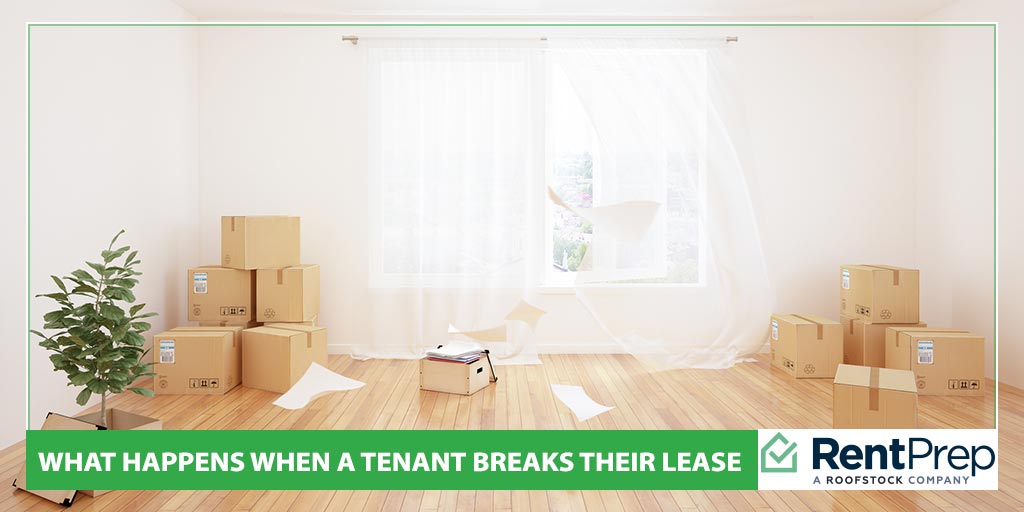
Updated October 2020
As a landlord, you spend a lot of time screening tenants, choosing the right fit, setting up a lease agreement, and getting them moved into the property. From there, you expect to proceed through the entire lease agreement before you have to repeat the process again, but that’s not always what happens.
Sometimes, a tenant suddenly breaks their lease. When a tenant breaks their lease early, you have a few factors to consider.
Assuming you and a tenant sign a rental agreement or lease, you both are bound to the terms of the contract. In most cases where the lease is broken early, it will be the tenant who initiates the early termination of a lease, either intentionally or unintentionally.
It is rare that a landlord or property owner breaks a lease, but that is a situation to consider as well.
What should you do whenever a tenant breaks their lease? Do you continue to pursue the tenant for rent, or do you move on to another tenant as soon as possible? If you don’t know how to proceed, you will end up losing more money than necessary.
This post will address the different scenarios of what happens if a tenant breaks the lease early and moves out.
A Table Of Contents For A Tenant Breaking Lease
- The Importance Of The Rental Lease
- When Is A Lease Considered Broken?
- What Happens When A Tenant Breaks Their Lease?
- How A Lease Can Be Broken: Three Situations
- FAQs: What Happens When You Break A Lease With Tenant?
The Importance Of The Rental Lease

The lease agreement is a very important part of the rental process. Everything written in the agreement sets out the expectations and rules for the use of the property by both you and the tenant. As a legally binding contract, both parties agree to follow those terms for the duration of the rental lease.
The rental lease covers more than just the dates that someone can use the property. It covers the rent payment rules, late fees, maintenance guidelines, and so much more.
Without a good rental agreement in place, it is going to be more difficult to have a successful landlord-tenant experience while a tenant is renting from you. That is why it is so important to make sure you cover key areas when writing and signing less agreements:
To learn more about writing a great lease, check out our complete guide here.
When Is A Lease Considered Broken?
What exactly does it mean to break a lease, and when is a lease considered to be broken? Really, these questions are two sides of the same coin.
As mentioned, the lease agreement is very important to the rental relationship. The agreement sets out the rules and boundaries of what can and cannot be done in regards to the property, and it should also cover the penalties of breaking those rules.
A lease is considered broken whenever one of the parties no longer abides by the rules of that agreement. Some examples of breaking lease include:
- Tenant stops paying rent
- Tenant seriously damages the property
- Tenant moves out with or without notice, with no intention to return
- Landlord stops maintaining the property
- Landlord enters the property without permission
Often, “breaking the lease” refers to a tenant that moves out of the property, with no intention to continue paying rent, before the rental period is over.
How a lease can be broken will depend on what is included in the lease as well as what the local and state laws are.
If your lease allows for tenants to bring over as many guests as they want, then bringing over guests would not break the lease. If, however, the lease says they may not have house guests for longer than two weeks and someone moves in for a month, the lease may be broken.
What Happens When A Tenant Breaks Their Lease?
When a tenant breaks the lease, you will need to handle the situation by moving forward with eviction court or by working with the tenant to fill the property as soon as possible. How you handle the broken lease will depend on what was done.
Violated Lease Terms: Eviction
If a tenant damages the property, stops paying rent, or otherwise needs to be evicted, you will need to start the eviction process.
The eviction process will allow you to try to resolve your differences with the tenant and then get a court judgement about whether or not the lease has been violated by the courts if necessary. While evictions can be stressful, they can also be necessary to regain control of your property.
Broken Lease Agreement: Collecting Rent & Moving On

If someone breaks the lease agreement and moves out, you will need to decide how you are going to continue. As the lease agreement may still technically be in play until certain parameters are matched, you will need to be careful.
The goal of this process, however, should be to:
- Collect any overdue rent
- Collecting an early termination fee, if included in the original lease
- Legally end the lease agreement
- Find a new tenant ASAP
The longer it takes to work through these steps, the more money you will lose. Moving quickly is important, but be sure you know what you are doing.
Your Duty To Re-Rent
In most states and cities, you are legally required to try to find a new tenant with reasonable effort if a tenant breaks the lease and moves out early. Rather than sitting back and simply collecting rent from the former tenant, you are required to market the property and accept any qualified applicants to rent the property.
By putting in reasonable effort, you can legally continue to collect rent from your former tenant until you find a new tenant. You do not have to lower the rent or spend more on marketing than you normally would, but you do have to put in the same effort that you usually do to fill a vacancy.
Regardless of the legal obligation, it is also in your best interest to find a new tenant to rent the property as soon as possible. Collecting overdue rent from a tenant that has already moved out can be messy, so it is best to limit the length of the vacancy as much as possible.
Signing An End Of Lease Agreement
If your tenant is moving out on good terms and has discussed the situation with you, it is best to sign an end of lease agreement with them. This agreement will detail what lease is being ended, what will happen with the property, and exactly what money will be owed.
Setting up this type of end of lease agreement is great not only for your documentation but also so you can sit down with the tenant and work out any last minute details. The agreement can even include information about any additional rent the tenant will owe, and it will clarify whether or not things like the security deposit have been addressed.
Documenting the end of lease officially is always a good idea when possible.
How A Lease Can Be Broken: Three Move-Out Situations
Tenants breaking a lease by moving out is a common occurrence. Often, tenants that are over their head believe they will be able to avoid the drama of not being able to pay rent and being evicted by just moving out.
Regardless of them moving out of the property, however, tenants have an obligation to pay rent for the contracted period in the lease agreement. So, what happens next when a tenant has decided they are not going to stay for the entire rental period?
Let’s take a closer look at three different ways this situation could play out.
#1 Break Lease With Advanced Notice
Most of the time, a tenant will seek an early termination to a lease or rental agreement because they need to move to another location, for whatever reason.
Many times, the tenant needs to move away from the area for a job. Another tenant might need to move because they or a family member are ill and need to seek medical treatment in another area. Obviously, they will seek to terminate the lease before it naturally expires.
There are many reasons why a tenant might want to move before their lease expires, but they should all be handled in a similar fashion when the tenant gives you advance notice.
What To Do
It behooves you to work with your tenant who wants to leave early and we suggest that you work with the tenant to make their move as painless for you and them as possible.
Of course, if they wish to vacate their rental unit early, you have to cover yourself financially. You will want to get as much advance notice as humanly possible so you can seek out a new tenant to fill the vacancy as soon as possible.
As you obviously want to find a new tenant as soon as possible, go through your normal tenant screening process.
The goal is to have a paying tenant in your rental unit for as much time as possible with little to no time in a vacant state. Every day you are without a paying tenant, your past tenant has to pay.
Work with your tenant to set up the conditions of the lease agreement ending. Depending on how fast you can get the property rented, you can simply sign off with the tenant to end the agreement. If you want them to be held responsible for the rent until the unit is rented, it is within your rights as a landlord to do so.
That being said, you must make your best-faith effort to find a new tenant while the old tenant is still paying on a property that they no longer inhabit.
#2 Breaking Lease With No Notice
Things get a bit messier when your tenant ups and leaves without notice and you have no way to get in touch with them after they leave. Things are muddled, too, when you initiate–knowingly or unknowingly–breaking a lease.
It is not uncommon to wake up one morning to find that one of your rental units had been vacated without any notice.
In this case, you had better follow all the proper procedures of your state. You want to make sure that you document everything. Usually, the process involves the following:
- Try to contact the tenant via the emergency contacts and work contacts you have on file.
- Begin to market the property as soon as the tenant has fully moved out.
- Do a normal move-out inspection process and document any damages as necessary.
- Keep all communication with the tenant on file; you may need this later on.
- Send letters to the tenant, informing them of their responsibility to pay rent until you find a new tenant. Keep a tab of what they owe if they do not pay rent.
- Pursue collecting that owed rent through eviction and civil court processes.
You should try to find your ex-tenant, but you also need to find a new tenant to fill the vacancy, forcing you to double your efforts.
In most situations, however, you should not allow a new tenant to move into the property until the old tenant has officially missed a rental payment date and the allotted grace period. This is because the tenant could return, and the agreement would still, technically, be in effect until the terms of the agreement are broken.
If you breach a rental agreement or lease, your tenant has a right to end the lease before its end date. They technically did not break the lease—you did.
#3 Breaking Lease With Proper Notice
In most jurisdictions, a tenant must give you 30 days or more notice before vacating the premises. This should give you enough time to find a new tenant.
In some jurisdictions, even with 30 days’ notice, the former tenant owes rent all the way up until the end of the lease or agreement, provided that the rental unit has not yet been occupied.
If the lease agreement is a month-to-month lease that allows for tenants to give 30 days’ notice to quit to property, however, this should not be considered breaking the lease. Instead, they are simply ending the agreement with the proper notice and cannot be penalized for doing so.
Do not think, however, that you can bring in a new tenant and keep collecting rent from the former tenant simultaneously. You cannot do this!
FAQs: What Happens When You Break A Lease With Tenant?
What Happens If A Tenant Breaks A Lease And Doesn’t Pay?
Collecting rent when a tenant doesn’t pay and moves out can be very difficult, and you will ultimately need to decide if that is something you want to pursue or not. To get that money back, you will likely need to get an eviction court judgement that the lease has, indeed, been broken.
From there, that judgement can be used in civil court to collect the rent from the tenant. Even with that judgement, actually collecting the rent can be very difficult. Consider if collecting this rent is important to you or if it is better to cut your losses and move on.
If A Tenant Breaks Their Lease, Can I Keep Their Deposit?
As long as your lease agreement makes this clear, most landlords will be able to keep the security deposit to cover expenses if a tenant breaks the lease early. It is very important that you include a specific clause about this use of a security deposit in your lease agreements to be sure.
Consider, however, that some states and localities might have more specific rules about how security deposits can be used. There is a chance that you may be required to return the deposit even if the tenant breaks the lease, so research this before you make the final call.
Does Breaking A Lease Count As An Eviction?
Technically speaking, breaking a lease is not the same thing as an eviction. An eviction happens whenever the terms of a lease are violated and the landlord wants the tenant to move out because of that breach. Breaking a lease, however, is when the tenant moves out on their own before the rental period is over.
Can A Tenant Look For Someone To Take Over Their Lease?
It is up to you as the landlord to decide if you are willing to look at tenant replacements found by your former tenant when remarketing the property. You are required to make a reasonable effort to fill the property after a tenant breaks lease, and that includes considering qualified tenants that your former tenant presents you with.
If you prefer to stick to your own marketing, however, that is also acceptable in most cases.
If you are accepting of someone taking over the remainder of your tenant’s lease and your tenant finds a good replacement, you will want to be sure to sign the appropriate paperwork to create a new and legally binding lease agreement with the new tenant.
What Happens When You Break A Renter’s Lease?
What happens if you, the landlord, break the terms of the lease agreement? This could happen if you do not keep the property in habitable conditions or you continually disrupt the tenant’s right to enjoy the property in peace.
If this happens, the tenant may have a legal right to move out. That right, however, would only apply in the most extreme cases.
These rights being violated constitutes a break in the lease, and that means the tenant could move out without any obligation to pay rent. This is an unlikely situation to find yourself in, but it’s important to know what could happen.
Conclusion
As you can see, there are some nuances to breaking a lease. Most often, leases and rental agreements are broken by your tenants. Work with them, and then get busy finding a new tenant.
Finding a new tenant, however, can take time. Consider whether or not trying to collect rent from your former tenant is going to be a worthy endeavor, or simply cut your losses and move on. There isn’t a one-size-fits-all solution on how to proceed. The key point is that you proceed carefully and with intention.
Need a rental agreement? Use ours! This rental agreement ensures that you cover all of the key areas that may become important if a lease is broken. Adding elements like an early termination fee and early termination rules can be a lifesaver.
For all of your tenant screening, background check, and credit check needs, turn to RentPrep.com.

